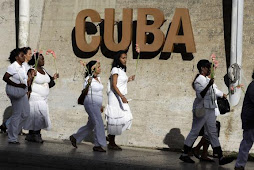CUBA
Sen. Feinstein singles out Cuba as potential drug smuggling point
By David Goodhue
dgoodhue@keysreporter.com
A California senator who chairs a congressional caucus on international
drug trafficking warned last week that Cuba could become a significant
hub for illegal drugs entering the United States in the near future.
Sen. Dianne Feinstein (D-Calif.) made the remarks while leading a
hearing on what several observers consider the growing possibility that
the Caribbean could become an even larger transit zone for illegal
drugs. If the trend happens or is happening, it is likely because of
increased pressure international law enforcement is placing on violent
drug cartels in Mexico and elsewhere in Central America, these observers
say.
While mentioning the growing drug violence throughout the Caribbean
during opening statements of the Feb. 1 hearing of the Senate Caucus on
International Narcotics Control, Feinstein said Cuba should not be
considered immune from the problem.
"I would be remiss not to mention Cuba. Just 90 miles from Florida, Cuba
has the potential to be a major trans-shipment point for illicit drugs,"
she said.
The statement comes just weeks after Cuba's state-run newspaper, Granma,
reported the communist government last year confiscated more
foreign-borne drugs than in any time during the past seven years.
It also comes as U.S. officials are making public statements over
concerns about increased smuggling activity in the Caribbean as a whole.
In October, William Brownfield, assistant secretary of the U.S. State
Department's Bureau of International Narcotics and Law Enforcement,
testified in front of Congress that increased attention on Mexico would
likely force drug smugglers to look to the Caribbean as a gateway to get
their products into the United States.
During the Feb. 1 hearing, Aubrey P. Marks, Jamaica's ambassador to the
United States, said her government fears the same thing. She told
Feinstein the possibility becomes even more real if the U.S. doesn't
better coordinate law enforcement efforts with all of its neighbors in
the Caribbean.
"Moreover, security efforts cannot be undertaken sequentially, as this
will create a 'balloon effect' to which Assistant Secretary Brownfield
alluded when he warned of the potential for the Caribbean to become, as
it was in the 1980s, the major trans-shipment point for illegal drugs
from South and Central America," Marks said in written testimony. "We
must agree that this is, currently, a very real possibility."
Already, Caribbean nations are seizing significantly more illegal drug
shipments than in previous years. Anibal de Castro, the Dominican
Republic's ambassador to the United States, said law enforcement in his
country confiscated almost 50 percent more cocaine passing through
Hispaniola in 2011 than in 2010.
"Only in the month of December of last year, joint efforts by law
enforcement agencies succeeded in intercepting four large shipments over
a two-week period totaling over 1.3 tons of cocaine," de Castro said.
While urging more law enforcement assistance from the United States,
Marks warned that economic help and job training should also be a part
of anti-drug efforts in the Caribbean. She said the poverty-stricken
conditions of many nations in the region create fertile ground for
international cartels and smugglers to recruit workers. Approaching the
problem too heavy-handedly, and with a focus solely on law enforcement,
could backfire and make the situation in these countries worse, Marks
told Feinstein.
"Often, actions taken by the U.S. in pursuance of one aspect of domestic
or foreign policy have unintended consequences for our countries and
undermines the efforts of other U.S. agencies to achieve the overall
goal of a more-secure third border with the Caribbean," Marks said.
"Let us not ignore the umbilical relationship between an underdeveloped
economy, social vacuums and narco-trafficking."
Jonathan C. Benjamin-Alvarado, a political science professor at the
University of Nebraska, said the possible shift in narcotics trafficking
to the Caribbean shows that enforcement operations Mexico are working.
But he also took issue with Feinstein's specific inclusion of Cuba in
her statement on the matter, noting that combating drug smuggling is one
area where the United States and Cuba work well together.
"It's really irresponsible for her to say that," Benjamin-Alvarado said.
"It sets in motion that the Cubans are doing nothing, which is
absolutely not true, and it insinuates that Cuba is descending into some
sort of narco state."





No comments:
Post a Comment